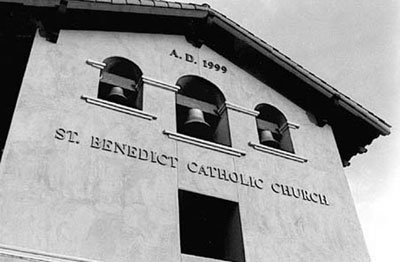For a century, Christians of many denominations have set aside a
week in January (Jan. 18 to 25) to pray for Christian Unity. Just
as Jesus himself prayed to God
”
that they may all be one,
”
today’s Christians are gathering together to pray that the
divisions within their faith that have developed over two millennia
can be resolved, allowing them to work more closely with each other
to achieve God’s will in this troubled world.
For a century, Christians of many denominations have set aside a week in January (Jan. 18 to 25) to pray for Christian Unity. Just as Jesus himself prayed to God “that they may all be one,” today’s Christians are gathering together to pray that the divisions within their faith that have developed over two millennia can be resolved, allowing them to work more closely with each other to achieve God’s will in this troubled world.
On Sunday, Jan. 20 at 3 p.m. a notable service of prayer will be held in Hollister.
Hosted by St. Benedict’s Roman Catholic Church, 1200 Fairview Road, the liturgy, which is based on one developed by an ecumenical body, supports the theme “Pray without ceasing” from Thessalonians, Chapter One.
Many San Benito County clergy will be participating:
– The Rev. Robert Rufener, pastor, Abundant Life Four Square Church
– The Rev. Jonathan Hughes, assistant pastor, First Presbyterian Church
– The Rev. Rudy Ruiz, pastor, Sacred Heart-St. Benedict Catholic Church
– The Rev. Tevita Vaikona, assistant pastor, Hollister United Methodist Church
– The Rev. Matthew Trasek, pastor, Trinity Lutheran Church
– The Very Rev. Larry Kambitch, pastor, Immaculate Conception Catholic Church, Tres Pinos
– The Rev. Edward Fitz-Henry, pastor, Old Mission San Juan Bautista
– The Rev. Ardess A. Golden, pastor, Hollister United Methodist Church
The service will feature a procession of all clergy; each clerical participant will read a portion of scripture or lead in prayer and light a candle representing “the dawning of a new day for the world, renouncing the shadows of sin, division and hatred.”
The liturgy will include hymns and music provided by the multiethnic choir from St. Francis Xavier Church in Seaside. An offering will be taken to support Emmaus House, the local home for unwed mothers. After the service, participants are invited for fellowship and refreshments in the parish hall.
Churches in Gilroy will also be observing this occasion on Jan. 20, but in a different manner: pulpit exchanges. Clergy from the city’s churches will be preaching a sermon or homily to congregations of a different historical tradition according to the following schedule:
– The Rev. Allison Berry, pastor of Gilroy United Methodist Church, will preach at the 9:30 a.m. service at Good Shepherd Lutheran Church
– The Rev. Pat Allen, deacon of St. Mary Catholic Church, will preach at the 10 a.m. service of Gilroy United Methodist
– The Rev. Ron Koch, pastor of Good Shepherd, will peach at St. Mary’s 11:30 a.m. Mass.
– The Rev. Allison Berry will also preach at St. Mary’s 5 p.m. Mass.
Students of history are aware that the generally good relations among the world’s Christians haven’t always existed. St. Paul’s letters in the New Testament show how differences in beliefs and practices among the followers of Jesus were already developing during the first century. Succeeding centuries saw such differences become schisms, excommunications, denunciations and even bloody wars.
Slowly, the situation improved – 100 years ago Father Paul Wattson, then an Episcopal priest and cofounder of the Society of the Atonement at Graymoor (New York) introduced a Prayer Octave (eight days) devoted to Christian Unity celebrated from Jan. 18 to 25. Exactly 60 years later, in 1968, churches around the world received for the first time material especially prepared for this week by the World Council of Churches (representing Protestants, Orthodox and Anglicans) and a Secretariat of the Roman Catholic Church. This was one of the fruits of what has been called the “Ecumenical Movement,” an aspiration towards the visible union of all believers in Christ.
Perhaps a key element in this changed atmosphere, moving from a spirit of competition and hostility to one of familial cooperation, was the Second Vatican Council’s Decree on Ecumenism in 1964, which referred to non-Catholic Christians for the first time as “separated brethren” (rather than “heretics”) and authorized a number of joint ventures with Protestant and Orthodox Christians.













